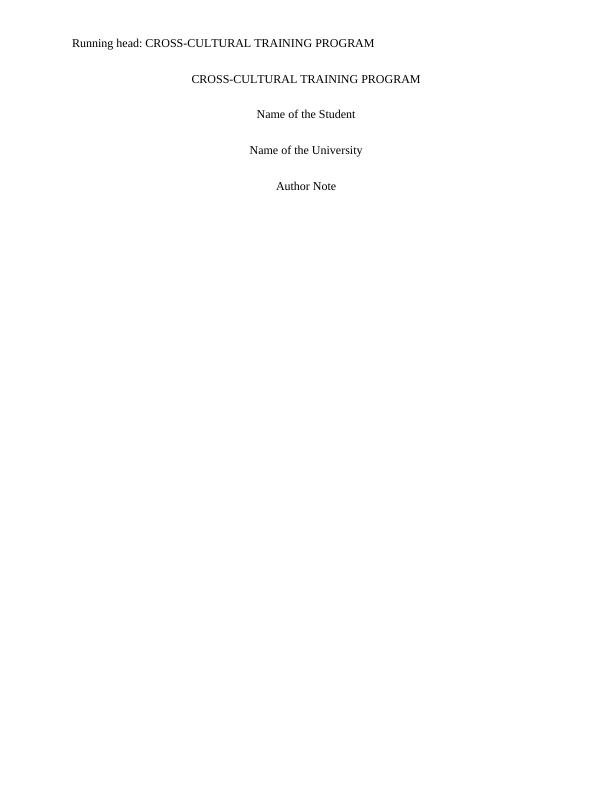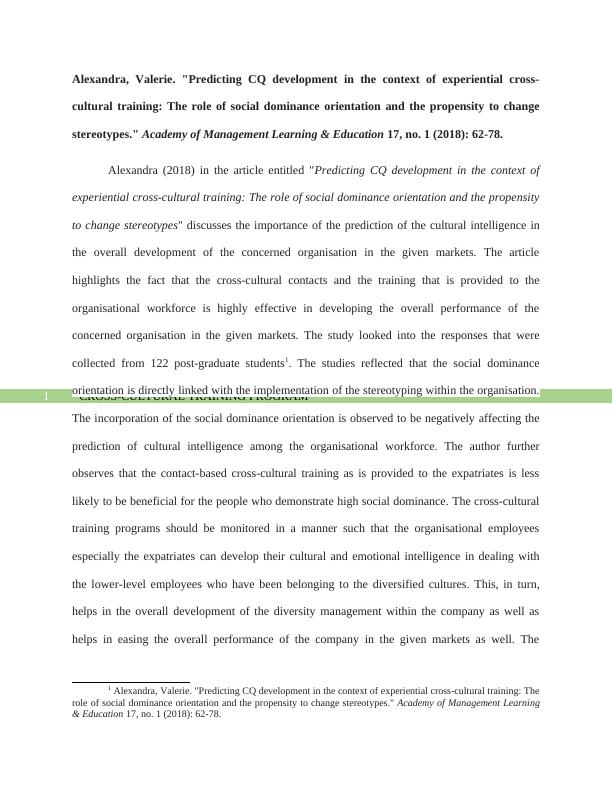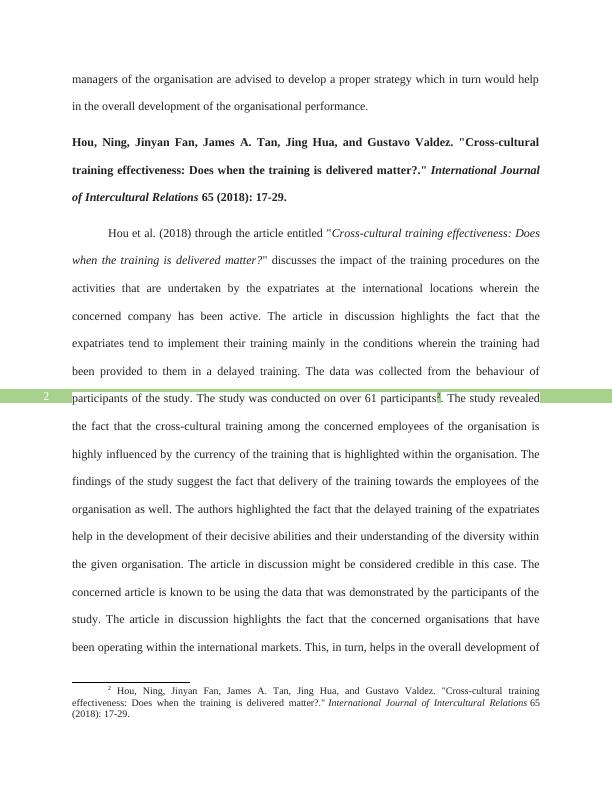Cross-Cultural Training Program for Organizational Workforce
Added on 2022-11-18
8 Pages1941 Words268 Views
Running head: CROSS-CULTURAL TRAINING PROGRAM
CROSS-CULTURAL TRAINING PROGRAM
Name of the Student
Name of the University
Author Note
CROSS-CULTURAL TRAINING PROGRAM
Name of the Student
Name of the University
Author Note

CROSS-CULTURAL TRAINING PROGRAM1
Alexandra, Valerie. "Predicting CQ development in the context of experiential cross-
cultural training: The role of social dominance orientation and the propensity to change
stereotypes." Academy of Management Learning & Education 17, no. 1 (2018): 62-78.
Alexandra (2018) in the article entitled "Predicting CQ development in the context of
experiential cross-cultural training: The role of social dominance orientation and the propensity
to change stereotypes" discusses the importance of the prediction of the cultural intelligence in
the overall development of the concerned organisation in the given markets. The article
highlights the fact that the cross-cultural contacts and the training that is provided to the
organisational workforce is highly effective in developing the overall performance of the
concerned organisation in the given markets. The study looked into the responses that were
collected from 122 post-graduate students1. The studies reflected that the social dominance
orientation is directly linked with the implementation of the stereotyping within the organisation.
The incorporation of the social dominance orientation is observed to be negatively affecting the
prediction of cultural intelligence among the organisational workforce. The author further
observes that the contact-based cross-cultural training as is provided to the expatriates is less
likely to be beneficial for the people who demonstrate high social dominance. The cross-cultural
training programs should be monitored in a manner such that the organisational employees
especially the expatriates can develop their cultural and emotional intelligence in dealing with
the lower-level employees who have been belonging to the diversified cultures. This, in turn,
helps in the overall development of the diversity management within the company as well as
helps in easing the overall performance of the company in the given markets as well. The
1 Alexandra, Valerie. "Predicting CQ development in the context of experiential cross-cultural training: The
role of social dominance orientation and the propensity to change stereotypes." Academy of Management Learning
& Education 17, no. 1 (2018): 62-78.
Alexandra, Valerie. "Predicting CQ development in the context of experiential cross-
cultural training: The role of social dominance orientation and the propensity to change
stereotypes." Academy of Management Learning & Education 17, no. 1 (2018): 62-78.
Alexandra (2018) in the article entitled "Predicting CQ development in the context of
experiential cross-cultural training: The role of social dominance orientation and the propensity
to change stereotypes" discusses the importance of the prediction of the cultural intelligence in
the overall development of the concerned organisation in the given markets. The article
highlights the fact that the cross-cultural contacts and the training that is provided to the
organisational workforce is highly effective in developing the overall performance of the
concerned organisation in the given markets. The study looked into the responses that were
collected from 122 post-graduate students1. The studies reflected that the social dominance
orientation is directly linked with the implementation of the stereotyping within the organisation.
The incorporation of the social dominance orientation is observed to be negatively affecting the
prediction of cultural intelligence among the organisational workforce. The author further
observes that the contact-based cross-cultural training as is provided to the expatriates is less
likely to be beneficial for the people who demonstrate high social dominance. The cross-cultural
training programs should be monitored in a manner such that the organisational employees
especially the expatriates can develop their cultural and emotional intelligence in dealing with
the lower-level employees who have been belonging to the diversified cultures. This, in turn,
helps in the overall development of the diversity management within the company as well as
helps in easing the overall performance of the company in the given markets as well. The
1 Alexandra, Valerie. "Predicting CQ development in the context of experiential cross-cultural training: The
role of social dominance orientation and the propensity to change stereotypes." Academy of Management Learning
& Education 17, no. 1 (2018): 62-78.

CROSS-CULTURAL TRAINING PROGRAM2
managers of the organisation are advised to develop a proper strategy which in turn would help
in the overall development of the organisational performance.
Hou, Ning, Jinyan Fan, James A. Tan, Jing Hua, and Gustavo Valdez. "Cross-cultural
training effectiveness: Does when the training is delivered matter?." International Journal
of Intercultural Relations 65 (2018): 17-29.
Hou et al. (2018) through the article entitled "Cross-cultural training effectiveness: Does
when the training is delivered matter?" discusses the impact of the training procedures on the
activities that are undertaken by the expatriates at the international locations wherein the
concerned company has been active. The article in discussion highlights the fact that the
expatriates tend to implement their training mainly in the conditions wherein the training had
been provided to them in a delayed training. The data was collected from the behaviour of
participants of the study. The study was conducted on over 61 participants2. The study revealed
the fact that the cross-cultural training among the concerned employees of the organisation is
highly influenced by the currency of the training that is highlighted within the organisation. The
findings of the study suggest the fact that delivery of the training towards the employees of the
organisation as well. The authors highlighted the fact that the delayed training of the expatriates
help in the development of their decisive abilities and their understanding of the diversity within
the given organisation. The article in discussion might be considered credible in this case. The
concerned article is known to be using the data that was demonstrated by the participants of the
study. The article in discussion highlights the fact that the concerned organisations that have
been operating within the international markets. This, in turn, helps in the overall development of
2 Hou, Ning, Jinyan Fan, James A. Tan, Jing Hua, and Gustavo Valdez. "Cross-cultural training
effectiveness: Does when the training is delivered matter?." International Journal of Intercultural Relations 65
(2018): 17-29.
managers of the organisation are advised to develop a proper strategy which in turn would help
in the overall development of the organisational performance.
Hou, Ning, Jinyan Fan, James A. Tan, Jing Hua, and Gustavo Valdez. "Cross-cultural
training effectiveness: Does when the training is delivered matter?." International Journal
of Intercultural Relations 65 (2018): 17-29.
Hou et al. (2018) through the article entitled "Cross-cultural training effectiveness: Does
when the training is delivered matter?" discusses the impact of the training procedures on the
activities that are undertaken by the expatriates at the international locations wherein the
concerned company has been active. The article in discussion highlights the fact that the
expatriates tend to implement their training mainly in the conditions wherein the training had
been provided to them in a delayed training. The data was collected from the behaviour of
participants of the study. The study was conducted on over 61 participants2. The study revealed
the fact that the cross-cultural training among the concerned employees of the organisation is
highly influenced by the currency of the training that is highlighted within the organisation. The
findings of the study suggest the fact that delivery of the training towards the employees of the
organisation as well. The authors highlighted the fact that the delayed training of the expatriates
help in the development of their decisive abilities and their understanding of the diversity within
the given organisation. The article in discussion might be considered credible in this case. The
concerned article is known to be using the data that was demonstrated by the participants of the
study. The article in discussion highlights the fact that the concerned organisations that have
been operating within the international markets. This, in turn, helps in the overall development of
2 Hou, Ning, Jinyan Fan, James A. Tan, Jing Hua, and Gustavo Valdez. "Cross-cultural training
effectiveness: Does when the training is delivered matter?." International Journal of Intercultural Relations 65
(2018): 17-29.

End of preview
Want to access all the pages? Upload your documents or become a member.
